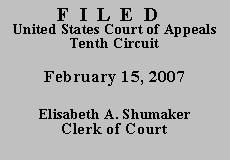

| GEORGE NIANIA,
Petitioner, v. ALBERTO R. GONZALES, Attorney General, Respondent. |
|
The Board of Immigration Appeals (BIA) affirmed the IJ's order without opinion, making the IJ's decision the final agency ruling for purposes of appeal. Tulengkey v. Gonzales, 425 F.3d 1277, 1279 (10th Cir. 2005). In his appeal, petitioner makes six ostensibly separate arguments, which actually reduce to three: he challenges the sufficiency of the evidence underlying the IJ's finding that exceptional hardship did not exist to justify cancellation of removal; he argues that he was denied due process because of the incomplete trial transcript; and he argues that removing his United States citizen child from the United States is unconstitutional.
As for the first argument, this court is without jurisdiction to review the IJ's discretionary rulings under 8 U.S.C. § 1229b. Ekasinta v. Gonzales, 415 F.3d 1188, 1191 (10th Cir. 2005). Petitioner's third argument is similarly without merit. "[T]he incidental impact visited upon the [citizen] children of deportable, illegal aliens does not raise constitutional problems." Delgado v. INS, 637 F.2d 762, 764 (10th Cir. 1980).
Petitioner's due process argument, however, gives us more pause. He maintains that, out of the ninety pages of hearing transcript, there are at least thirty-one indications that statements were indiscernible.
Due process requires that an alien at a removal hearing must have "an opportunity to be heard, to cross-examine witnesses against him, and to produce evidence . . . and that the decision be supported by substantial evidence." Hadjimehdigholi v. INS, 49 F.3d 642, 649 (10th Cir. 1995) (internal quotation marks omitted). One of an applicant's rights in an immigration proceeding is that "a complete record shall be kept of all testimony and evidence produced at the proceeding." 8 U.S.C. § 1229a(b)(4)(C). It is the government's "duty to prepare a reasonably accurate, reasonably complete transcript." Ortiz-Salas v. INS, 992 F.2d 105, 106 (7th Cir. 1993). The absence of a "reasonably complete transcript" can "hamper[] the ability of an alien to mount a challenge to the proceedings that were conducted before the IJ" and "foreclose effective administrative and judicial review." Kheireddine v. Gonzales, 427 F.3d 80, 84 (1st Cir. 2005) (quotation omitted).
To a establish a due process violation based on an "inaccurate or incomplete transcription," however, an alien must show "specific prejudice to his ability to perfect an appeal." Id. at 85 (quotation omitted). "[P]rejudice to warrant a remand cannot be shown if the transcription failure does not make any difference to the outcome of the review." Id. at 86. In other words, prejudice requires a showing "that a complete and accurate transcript would have changed the outcome of the case." Ortiz-Salas, 992 F.2d at 106.
We have reviewed the hearing testimony, paying particular attention to the portions afflicted with transcription problems.(1) The existing transcript provides more than enough evidence of petitioner's child's medical condition and the possible psychiatric component should his asthma worsen. This slightly flawed transcript did not prejudice petitioner's ability to appeal the denial of cancellation of removal to the BIA or to seek review in this court. Moreover, petitioner does not claim that the "indiscernible" statements could have supplied outcome-changing facts. Without a showing that transcription errors prejudiced petitioner's ability to present his argument, we must conclude that the transcript's deficiencies do not amount to a due process violation. See id. at 106-07 (holding that hearing transcript with 292 "inaudible" or "indiscernible" notations did not violate applicant's due process rights because he could not demonstrate prejudice).
Petitioner's unopposed motion to file his reply brief out of time is GRANTED. To the extent petitioner challenges the discretionary rulings supporting the denial of cancellation of removal under 8 U.S.C. § 1229b, we DISMISS the petition for review for lack of appellate jurisdiction. We DENY the remainder of the petition for review.
Entered for the Court
District Judge
*. After examining the briefs and appellate record, this panel has determined unanimously to grant the parties' request for a decision on the briefs without oral argument. See Fed. R. App. P. 34(f); 10th Cir. R. 34.1(G). The case is therefore ordered submitted without oral argument. This order and judgment is not binding precedent, except under the doctrines of law of the case, res judicata, and collateral estoppel. It may be cited, however, for its persuasive value consistent with Fed. R. App. P. 32.1 and 10th Cir. R. 32.1.
2. The Honorable Wesley E. Brown, Senior District Judge, District of Kansas, sitting by designation.
1. The great majority of problems occurred during the testimony of Dr. Benjamin O'Brien, a psychiatrist dealing with psychiatric problems in asthmatic children, who testified telephonically over speaker phone.